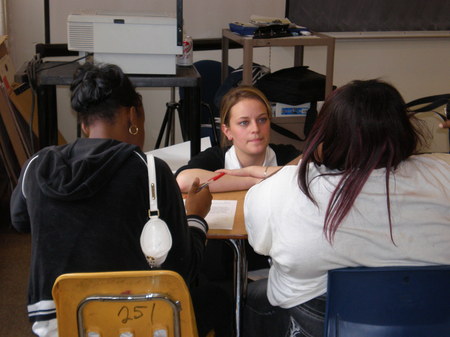 Annie appears born to teach. A third grade teacher near Bucktown, she bursts with enthusiasm, gesticulating excitedly when talking about her students or a math curriculum she thinks highly of.
Annie appears born to teach. A third grade teacher near Bucktown, she bursts with enthusiasm, gesticulating excitedly when talking about her students or a math curriculum she thinks highly of.
The majority of her students are Latino; she is white. Born on the East Coast and educated in Urbana-Champaign, she now lives in the neighborhood, and likes it that way. On the way to the interview, she says, she ran into a student from the past year.
She comes from a family of educators, and has wanted to teach from a young age. Now in her sixth year of teaching, she plans to be an educator for life.
I was lucky to grow up in a town where the public system was phenomenal. I had great teachers. When I go home, I still visit my teachers from as far back as third grade. In my class, we do a project called Flat Stanley, and every year I send a Flat Stanley back to my old third grade teacher's classroom. My third grade teacher now can see me as a third grade teacher.
Continue reading this entry »
— Micah Uetricht /
 Mark Janka hunkers down in a booth at George's Family Restaurant & Pancake House in Oak Park. He self-effacingly curls against the window and somewhat slyly orders a francheezie plate from the waitress. The cold air outside presses against the restaurant's walls, but is offset by the warm hum of the diner's neon lights, which complements Janka's demeanor. He's soft-spoken yet demonstrably passionate, and comes off like a teacher who not so much commands a classroom as he fluidly guides it. Perhaps he's that teacher that allows the troublesome kid in back to crack just one too many jokes, but through some innate sense, that same kid feels racked with guilt for disrupting good Mr. Janka's lesson, and stays after class on his own volition to apologize.
Mark Janka hunkers down in a booth at George's Family Restaurant & Pancake House in Oak Park. He self-effacingly curls against the window and somewhat slyly orders a francheezie plate from the waitress. The cold air outside presses against the restaurant's walls, but is offset by the warm hum of the diner's neon lights, which complements Janka's demeanor. He's soft-spoken yet demonstrably passionate, and comes off like a teacher who not so much commands a classroom as he fluidly guides it. Perhaps he's that teacher that allows the troublesome kid in back to crack just one too many jokes, but through some innate sense, that same kid feels racked with guilt for disrupting good Mr. Janka's lesson, and stays after class on his own volition to apologize.
Continue reading this entry »
— Ben Schulman
 This story was written by Yana Kunichoff.
This story was written by Yana Kunichoff.
Lara Lindh (not her real name) an early childhood education teacher at a public school on the Northwest side of Chicago in her early 30s, speaks slowly and deliberately. Her enunciation is effortlessly precise, as are her hand movements and color coordination. Her white blouse is covered with tiny bouquets of flowers that match the greenish-blue of her eyes and the mustard yellow of her upswept hair. She holds her left hand around her iced tea for the duration of our interview while gesturing, and punctuating, with her right. "Play is the work of children," she says.
Lindh is from Cincinnati and has been teaching for four years. Prior to getting her degree in early childhood education, she was a bartender and a political activist when she realized she wanted to go into a "caring profession." She says she considered becoming a pediatric nurse but went instead into teaching young children -- not entirely surprising for a woman who had a collection of over 6,000 children's storybooks before she even became a teacher. She was trained at Columbia College, one of the few schools in the country which teaches the Reggio Emilia approach, which seeks to build up the values of respect, responsibility and community through exploration and discovery, and Lindh swears by it.
She consistently refers to the students she teaches as "little personalities" or "little people," and on any one day Lindh says she will find herself in a room with up to 20 small personalities who may speak any mixtures of English, Spanish, Arabic or Polish. This explains why one of the books she brings with her to our meeting is The Black Book of Colors, a children's book entirely in black with no words but raised representations of sensations, such as feathers, meant to be experienced not through language but with the touch.
---
I'm lucky to teach in one of the few public schools in Chicago that is also embarking on an exploration of the Reggio approach in their early childhood classrooms but you know we're very limited by a few things that are happening in education. The way early childhood programs in Illinois are funded is through state funding, it's called Preschool for All. Five years ago there was a huge expansion of pre-school because the state was flush with cash, but today since the state budget crisis that's different. Year to year you just don't know if you're going to have a job, if your program is going to be open the next year. So that's how we are funded. We are part of the Chicago public schools so you know our buildings and all of that are supplied through mainstream funding.
Continue reading this entry »
— Mechanics
Morning gang! Tune into WBEZ's 848 program this morning; host Alison Cuddy will be talking to a number of guests about public education here in Chicago, including yours truly. I'll be talking about the changes at CPS and the background and future plans for our new "Classroom Mechanics" teacher oral history project. Show begins at 9am and repeats at 9pm.
UPDATE: Here's audio of the segment.
— Ramsin Canon

Lindsey Rohwer is a 26-year old Spanish teacher who lives in Lakeview. A native of Omaha, she began teaching in Chicago in 2006 at Corliss High School on the South Side through Teach for America, a non-profit organization that places recent college graduates in schools in low-income communities. Rohwer fulfilled her two-year commitment with Teach for America in 2008 and worked at Corliss for another year. In August 2009, she started a new position as a Spanish I and II teacher at TEAM Englewood Community Academy High School. A few weeks before Rohwer began her second year at TEAM Englewood, I sat down with her at a Starbucks in Bridgeport to discuss her experience teaching and why she remains committed to staying in a classroom beyond her tenure with Teach for America.

I grew up in Omaha, Nebraska. My mom and both my aunts were public school teachers. I grew up in the suburbs of Omaha, and it was a really fantastic school district. So my experience with public school is that it is very high quality, just excellent education from those schools. Then I went to school at the University of Kansas and was a Spanish and International Studies major. I thought I wanted to go to grad school and do foreign policy, sort of more on the politics side of things. During my senior year, I heard a couple of people that had done Teach for America and I started to find out more about it. To be honest it seemed at the time like a good two-year buffer before I actually had to decide what I was really going to do, so that is what drew me to it. I had done tutoring and teaching throughout college, and really enjoyed it, but I did not have an interest in having a career in public education. So it was really like, 'This will be something I will enjoy doing for two years. It will be a challenge.' Then I will go on to do what I really planned to do.
Continue reading this entry »
— Sheila Burt /
 As Mark and I are sitting in a Northwest Side coffee shop, the baristas make the unfortunate choice to blare a Black Sabbath album at a volume that makes it difficult for me to hear myself, much less Mark's stories from teaching. But despite the cacophony in the air around us, Mark is unfazed. A young white science teacher, Mark takes teaching in an all-black South Side high school very seriously; when I comment on the deafening roar of the music, he gives me a look that indicates he barely noticed it. He has given the topic of his school and his students his utmost attention--little can break his train of thought.
As Mark and I are sitting in a Northwest Side coffee shop, the baristas make the unfortunate choice to blare a Black Sabbath album at a volume that makes it difficult for me to hear myself, much less Mark's stories from teaching. But despite the cacophony in the air around us, Mark is unfazed. A young white science teacher, Mark takes teaching in an all-black South Side high school very seriously; when I comment on the deafening roar of the music, he gives me a look that indicates he barely noticed it. He has given the topic of his school and his students his utmost attention--little can break his train of thought.
A native of a northern suburb, Mark went to school at an elite private university out of state, returning home to teach. He was first hired to teach high school in a rich, mostly-white neighborhood, but was pink-slipped; after substitute teaching for a year on the South and West Sides, he was hired at a high school on the South Side, where he now lives. Several times during his tenure as a sub, he taught at schools where a student had been killed the day before.
In his early twenties, he's about as young as a teacher can be. In conversing about his experiences, however, one could easily mistake his seemingly seasoned demeanor for that of an educator with a decade of experience.
Continue reading this entry »
— Micah Uetricht /
 We are none of us either angels or devils, and that fact is where the best stories live.
We are none of us either angels or devils, and that fact is where the best stories live.
Teachers are wrongly lauded as heroes and demeaned as Those Who Can't.
At Mechanics we've been covering the struggle of educators and parents to overcome a rigid bureaucracy and a generation of onslaught on the public schools. We can lose our heads -- we all of us can -- and begin taking sides that refuse nuance.
How around that?
We decided to go out and talk to teachers -- public and charter, neophytes and seasoned, currently working and laid off -- and bring their own voice to the discussion. We weren't interested in hearing about the wild regrets and the bloody sweats, but the day to day. What it takes to teach, what a teacher faces, and how they're rewarded and punished.
This project is ongoing. Over the next few months we want to bring as many teacher voices to you our readers as we can get to. If you are yourself an educator, a student, a parent, or just know someone who'd be interested in participating or who should participate, please, get in touch.
Wherever you are in the debate on the future of education, you must agree that we have to all of know us what it means -- and what it takes -- to teach, first. Let's not reduce things to abstractions or absurdities. Let's not exalt angels and condemn devils that after all are neither.
Our first history will go up tomorrow, Wednesday, October 20.
— Ramsin Canon /
 Annie appears born to teach. A third grade teacher near Bucktown, she bursts with enthusiasm, gesticulating excitedly when talking about her students or a math curriculum she thinks highly of.
Annie appears born to teach. A third grade teacher near Bucktown, she bursts with enthusiasm, gesticulating excitedly when talking about her students or a math curriculum she thinks highly of.











